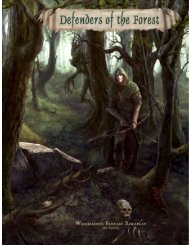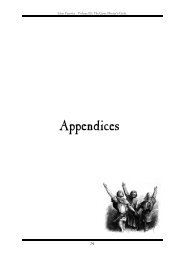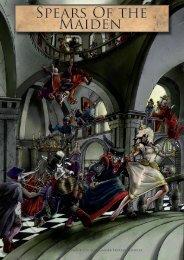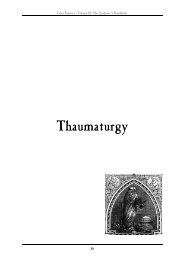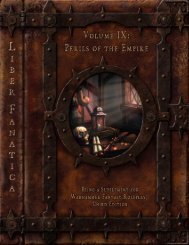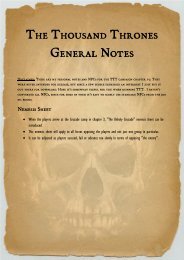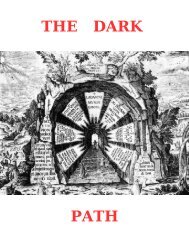Download Here (5.27 MB) - Liber Fanatica
Download Here (5.27 MB) - Liber Fanatica
Download Here (5.27 MB) - Liber Fanatica
You also want an ePaper? Increase the reach of your titles
YUMPU automatically turns print PDFs into web optimized ePapers that Google loves.
<strong>Liber</strong> <strong>Fanatica</strong> - Volume III : The Game Master’s Guide<br />
later get children, or have them killed by their<br />
families.<br />
Change also occurs to the PCs. The WFRP career<br />
scheme is meant for characters to grow in<br />
society. Their status will change with each career<br />
switch, and with this, the type of adventure will<br />
have to change as well. A rat catcher will get<br />
involved in a different kind of adventure than a<br />
cat burglar, and a crime lord will face still other<br />
challenges. Another consequence of the career<br />
system is that the character will need to change<br />
careers from time to time. Since you hand out<br />
XPs, the pacing of this is much in your hands. By<br />
the time that a PC is ready to get into a new<br />
career, be sure that the story has offered him<br />
opportunities to do so; the PC should have met<br />
some prospective employers by now or<br />
encountered other opportunities to enter a new<br />
career.<br />
End<br />
The end of a campaign is the place where all<br />
unresolved plotlines come together and (most of<br />
them) come to a close in a big climax. Ideally,<br />
from the start the campaign has been built with<br />
this ending in sight – it should have campaign<br />
plots and story elements built in with a clear aim<br />
at them being used or resolved in this phase of<br />
the campaign. If timed well, the end also sees the<br />
PCs in the careers they had been aiming for since<br />
the start (or equivalent ones if they changed<br />
directions somewhere during the campaign) and<br />
when their personal goals are met.<br />
Does a campaign need an end? Some do, and<br />
some don’t. Certainly with structured campaigns,<br />
at a certain moment the story is told, the foes<br />
have been vanquished, the good guys have<br />
married the beautiful princesses and everyone<br />
lives happily ever after. What is more, a well<br />
planned campaign leads to a climax and a good<br />
wrapping up of plot threads. Once that climax is<br />
over, what happens afterward usually does not<br />
reach the same heights anymore. The TEW<br />
campaign ends in Empire in Flames with an<br />
Empire torn apart in civil war, and the PCs sent<br />
off to find a relic of Sigmar in order to repair it. It<br />
is a grandiose spectacle (and if you cannot find it,<br />
Alfred Nunez’ freely downloadable replacement<br />
Empire at War promises to be even grander),<br />
which closes off the continuing Purple Hand plot<br />
thread and several other ones that ran<br />
throughout the campaign. It would be difficult to<br />
top that without making it look artificial.<br />
Campaigns sometimes go on after such a final<br />
climax, and a prime reason for that is often<br />
inertia. The group is used to the schedule of<br />
meeting once a week and playing WFRP, players<br />
(and sometimes the GM as well) cannot say<br />
goodbye to their characters.<br />
While this problem is specific for structured<br />
campaigns, another one touches on all WFRP<br />
campaigns. The career mechanics of WFRP are<br />
based on the idea that the characters steadily<br />
become more powerful and get more influence in<br />
the Warhammer world. Actually, this is one of the<br />
game’s strengths: seeing characters gradually<br />
becoming important in society; growing from<br />
lowly Rat Catchers to Noble Lords. At a certain<br />
moment that growth comes to an end, however –<br />
or at least, the PCs’ lives are at such high levels<br />
that their adventures are not gritty and perilous<br />
enough anymore to be real Warhammer<br />
adventures anymore. A Noble Lord, Guild Master,<br />
High Priest or someone in a similar function<br />
won’t descend into the sewers to find a runaway<br />
goblin, or go on a quest to find a holy hammer;<br />
they have their people for that, or at least the<br />
money and power to hire those people.<br />
Most campaigns benefit from an ending, though.<br />
An ending gives closure to the story, a sense of<br />
accomplishment for the players and it prevents<br />
the campaign from going stale by endless<br />
repetition. The main jobs for the GM at this<br />
phase are:<br />
- Getting the plot lines together and resolving<br />
them;<br />
- Getting the PCs where their players want<br />
them to be;<br />
- Gearing things up to a climax.<br />
If everything has gone well in the previous stages,<br />
these points have been prepared in advance and<br />
this is not as much work as it seems. In<br />
roleplaying campaigns things rarely go as<br />
planned, though.<br />
Bringing together and resolving plot lines is the<br />
main function of the ending. In preparation for it,<br />
the GM must have an idea what will happen<br />
here, an idea that gets more detailed the closer<br />
the ending comes. Then he can have a look at the<br />
still open plotlines and think how to fit them in<br />
that ending. Another thing that needs to be done<br />
is to check whether the PCs need information,<br />
special items or other stuff in order to succeed in<br />
the ending, and provide it to them. Certain plot<br />
developments might need to be sped up or slowed<br />
down in order to let everything fall together at the<br />
right time.<br />
During the game, PCs have had personal goals,<br />
either defined at character creation or developed<br />
through the campaign. In WFRP, some goals are<br />
set by the career system, while other goals are<br />
less system-related. In preparation of the ending,<br />
the GM should make a quick check of those<br />
character goals, and more important, player<br />
goals, and make sure that they are fulfilled when<br />
the campaign ends.<br />
The ending itself should lead up to a climax. Most<br />
people take this to mean a gigantic combat or<br />
action scene, but while that is certain a<br />
possibility, it is not the only one. In Perry Mason<br />
mysteries and movies like A Few Good Men the<br />
climax of the story is a court scene, which can be<br />
as exciting as an action scene. In movies like<br />
Angel Heart, The Usual Suspects and certainly<br />
6



